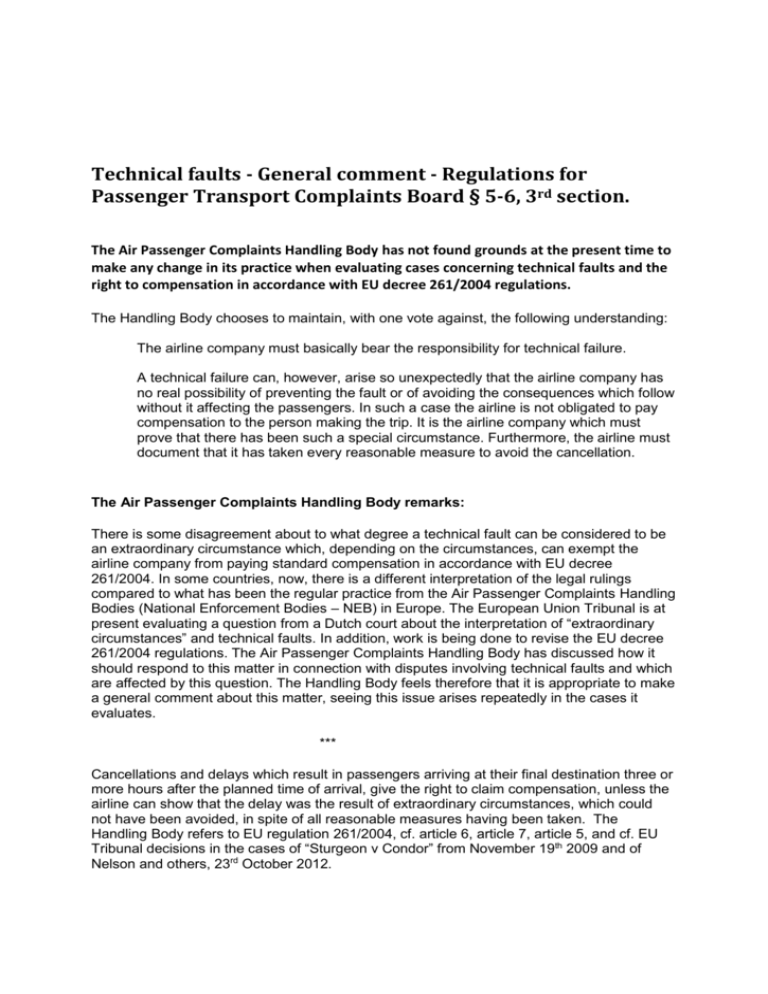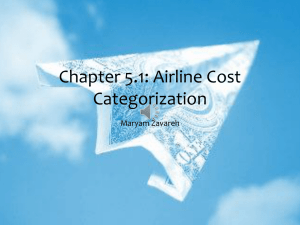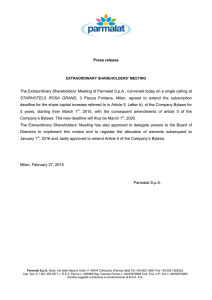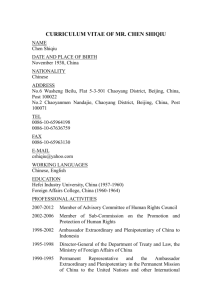Technical faults - General comment
advertisement

Technical faults - General comment - Regulations for Passenger Transport Complaints Board § 5-6, 3rd section. The Air Passenger Complaints Handling Body has not found grounds at the present time to make any change in its practice when evaluating cases concerning technical faults and the right to compensation in accordance with EU decree 261/2004 regulations. The Handling Body chooses to maintain, with one vote against, the following understanding: The airline company must basically bear the responsibility for technical failure. A technical failure can, however, arise so unexpectedly that the airline company has no real possibility of preventing the fault or of avoiding the consequences which follow without it affecting the passengers. In such a case the airline is not obligated to pay compensation to the person making the trip. It is the airline company which must prove that there has been such a special circumstance. Furthermore, the airline must document that it has taken every reasonable measure to avoid the cancellation. The Air Passenger Complaints Handling Body remarks: There is some disagreement about to what degree a technical fault can be considered to be an extraordinary circumstance which, depending on the circumstances, can exempt the airline company from paying standard compensation in accordance with EU decree 261/2004. In some countries, now, there is a different interpretation of the legal rulings compared to what has been the regular practice from the Air Passenger Complaints Handling Bodies (National Enforcement Bodies – NEB) in Europe. The European Union Tribunal is at present evaluating a question from a Dutch court about the interpretation of “extraordinary circumstances” and technical faults. In addition, work is being done to revise the EU decree 261/2004 regulations. The Air Passenger Complaints Handling Body has discussed how it should respond to this matter in connection with disputes involving technical faults and which are affected by this question. The Handling Body feels therefore that it is appropriate to make a general comment about this matter, seeing this issue arises repeatedly in the cases it evaluates. *** Cancellations and delays which result in passengers arriving at their final destination three or more hours after the planned time of arrival, give the right to claim compensation, unless the airline can show that the delay was the result of extraordinary circumstances, which could not have been avoided, in spite of all reasonable measures having been taken. The Handling Body refers to EU regulation 261/2004, cf. article 6, article 7, article 5, and cf. EU Tribunal decisions in the cases of “Sturgeon v Condor” from November 19th 2009 and of Nelson and others, 23rd October 2012. It is not uncommon that a flight has to be cancelled or is delayed as a result of a technical fault with the aircraft. There is some disagreement about to what extent a technical fault can be regarded as an extraordinary circumstance which, depending on the circumstances, may lead to the airline being relieved of its liability to pay compensation according to EU decree regulations. The Air Passenger Complaints Handling Body has made the following remarks in a number of cases it has assessed: The Handling Body feels that the airline must fundamentally bear the responsibility for technical failure. The airline has the obvious opportunity to influence the occurrence of technical faults, and to take measures to prevent them from occurring. Also with a view to avoiding problems in the future, the main rule should be that the airline bears the responsibility for technical failure. A technical failure can, however, arise so unexpectedly that the airline cannot prevent the fault or take measures to avoid the consequences arising from the technical failure, without causing problems for the passengers. In such situations, the airline is not held liable to pay compensation to its passengers. It is the airline which must establish that the circumstance qualifies as extraordinary, and that it has done everything possible to prevent the cancellation. The EU decree 261/2004 regulations do not provide any definition of what can be considered to be “an extraordinary circumstance”. However, in the introductory preamble, recital 14, the following comment is made: In the same manner as specified under the Montreal Convention, the airline companies’ obligations should be limited or should cease to apply in cases where an incident is caused by extraordinary circumstances which could not have been avoided in spite of all reasonable measures having been taken. Such circumstances can in particular arise in situations of political unrest, weather conditions which make it impossible to fly, security risks, unexpected deficiencies regarding flight security, and strikes which affect the operation of the transporting company. The European Union Tribunal came to a verdict on 22nd December 2008, in case C-549/07 between Wallentin-Hermann and Alitalia, having assessed the question about if a technical fault can be regarded as an extraordinary circumstance which can subsequently lead to the airline companies being exempted from bearing the responsibility to pay compensation. The Tribunal stipulates the following in § 21-26: (21) In this respect, the Community legislature indicated, as stated in recital 14 in the preamble to Regulation No 261/2004, that such circumstances may, in particular, occur in cases of political instability, meteorological conditions incompatible with the operation of the flight concerned, security risks, unexpected flight safety shortcomings and strikes that affect the operation of an air carrier. (22) It is apparent from that statement in the preamble to Regulation No 261/2004 that the Community legislature did not mean that those events, the list of which is indeed only indicative, themselves constitute extraordinary circumstances, but only that they may produce such circumstances. It follows that all the circumstances surrounding such events are not necessarily grounds of exemption from the obligation to pay compensation provided for in Article 5(1)(c) of that regulation. (23) Although the Community legislature included in that list ‘unexpected flight safety shortcomings’ and although a technical problem in an aircraft may be amongst such shortcomings, the fact remains that the circumstances surrounding such an event can be characterised as ‘extraordinary’ within the meaning of Article 5(3) of Regulation No 261/2004 only if they relate to an event which, like those listed in recital 14 in the preamble to that regulation, is not inherent in the normal exercise of the activity of the air carrier concerned and is beyond the actual control of that carrier on account of its nature or origin. (24) In the light of the specific conditions in which carriage by air takes place and the degree of technological sophistication of aircraft, it must be stated that air carriers are confronted as a matter of course in the exercise of their activity with various technical problems to which the operation of those aircraft inevitably gives rise. It is moreover in order to avoid such problems and to take precautions against incidents compromising flight safety that those aircraft are subject to regular checks which are particularly strict, and which are part and parcel of the standard operating conditions of air transport undertakings. The resolution of a technical problem caused by failure to maintain an aircraft must therefore be regarded as inherent in the normal exercise of an air carrier’s activity. (25) Consequently, technical problems which come to light during maintenance of aircraft or on account of failure to carry out such maintenance cannot constitute, in themselves, ‘extraordinary circumstances’ under Article 5(3) of Regulation No 261/2004. (26) However, it cannot be ruled out that technical problems are covered by those exceptional circumstances to the extent that they stem from events which are not inherent in the normal exercise of the activity of the air carrier concerned and are beyond its actual control. That would be the case, for example, in the situation where it was revealed by the manufacturer of the aircraft comprising the fleet of the air carrier concerned, or by a competent authority, that those aircraft, although already in service, are affected by a hidden manufacturing defect which impinges on flight safety. The same would hold for damage to aircraft caused by acts of sabotage or terrorism. The EU decree 261/2004 regulations are in the process of being revised. In the draft of the revised version dated 13th March 2013, the following comment is made in point 3.3: The proposal aims to improve enforcement by clarifying key principles and implicit passenger rights that have given rise to many disputes between airlines and passengers in the past; and by enhancing and better coordinating the enforcement policies carried out on a national level. 3.3.1.1. Clarification of key principles Definition of "extraordinary circumstances": the proposal clearly defines the term in line with the European Court's decision in the case C-549/07 (Wallentin-Herman), i.e. circumstances which, by their nature or origin, are not inherent in the normal exercise of the activity of the air carrier concerned and are beyond its actual control. Furthermore, for further legal certainty, the proposal introduces a non-exhaustive list of circumstances to be regarded as extraordinary and of circumstances to be regarded as non-extraordinary. In the draft suggested, the following definition is stated in article 1 (e) (m): "extraordinary circumstances" means circumstances which, by their nature or origin, are not inherent in the normal exercise of the activity of the air carrier concerned and are beyond its actual control. For the purposes of this Regulation, extraordinary circumstances shall include the circumstances set out in the Annex; Annex 1 gives examples of extraordinary circumstances. The following comments are made in Point ii: Technical problems which are not inherent in the normal operation of the aircraft, such as the identification of a defect during the flight operation concerned and which prevent the normal continuation of the operation; or hidden manufacturing defect revealed by the manufacturer or a competent authority and which impinges on flight safety. Annex 1 also gives examples of what should not be regarded as an extraordinary circumstance: Technical problems inherent in the normal operation of aircraft, such as a problem identified during the routine maintenance or during the pre-flight check of the aircraft or which arises due to failure to correctly carry out such maintenance or pre-flight check. The Air Passenger Transport Complaints Handling Bodies, in Europe, (the National Enforcement Bodies [NEB], cf. decree article 16), under the leadership of the European Commission, compiled a “preliminary list of extraordinary circumstances” on 12th April 2013. The list was published on the Commission’s website. After a complaint to the Ombudsmann, the term “preliminary” was altered on 22nd October 2013 to “Draft”. A sentence was also added about “Understanding between NEB-NEB", specifying the following: This document has been published at the request of the NEB's. This document is for information and guidance. The content of this document has not been adopted or in any way approved by the European Commission and should not be relied upon as a statement of the European Commission’s position. From the list of extraordinary circumstances, the following are named: 21 Unexpected flight safety shortcomings Any technical issues which cause the pilot to carry out an aircraft turnaround or diversion. 22 Unexpected flight safety shortcomings Failure of the bleed-air system/environmental control system on an aircraft (which had been properly maintained) either immediately prior to departure or in-flight. 23 Unexpected flight safety shortcomings Premature failure of life-limited parts (as referenced in applicable maintenance data, contained within the aircraft maintenance manual, or Maintenance Planning Document (MPD), or Maintenance Review Board Report (MRBR)) prior to their scheduled inspection/removal/retirement date (where those parts had been maintained in accordance with the required maintenance programme). 24 Unexpected flight safety shortcomings Failure of on-condition/condition monitored parts i.e. parts which should not require unscheduled maintenance or replacement during normal operational service (for example propeller oil-temperature gauges. The premature failure of these parts during normal operational service when maintained in accordance with the maintenance programme is unpredictable). 25 Unexpected flight safety shortcomings Failure of necessary or required aircraft systems (for example the cooling system, avionics system, flight control system, flaps, slats, rudders, thrust reverser, landing gear) either immediately prior to departure or in-flight (where those systems had been maintained in accordance with the required maintenance programme). 26 Unexpected flight safety shortcomings Any other technical defects which become apparent immediately prior to departure or in-flight (where the system or part had been maintained in accordance with the required maintenance programme) and which require investigation and/or repair before the aircraft is airworthy for the intended flight. 27 Unexpected flight safety shortcomings Smoke, fire or fumes on board the aircraft unless the problem has been caused by a part not being maintained in accordance with the required maintenance programme or due to a failure to follow appropriate operational procedures. On 28th May 2014, the European Union Court received an inquiry from a Dutch court about the interpretation of extraordinary circumstances and technical faults, case C-257/14: van der Lans – KLM. The inquiry has been accepted for assessment. The court proceedings for the case, as of 26th January 2015, have not yet been given a scheduled date. The Court of Appeal in Great Britain (compatible to the Norwegian magistrate’s court) came to a verdict on 11th June 2014 in the case between Jet2 and Huzar. The court was of the opinion that a technical fault with the aircraft cannot be considered to be an extraordinary circumstance in the sense indicated by the EU decree. The English Supreme Court rejected the appeal against the verdict on 30th October 2014. The following statement is made in the comment, that: The application does not raise a point of law of general public importance and, in relation to the point of European Union law said to be raised by or in response to the application, it is not necessary to request the Court of Justice to give any ruling because the Court's existing jurisprudence already provides a sufficient answer. Østre landsrett in Denmark (compatible to the Norwegian magistrate’s court) came to a verdict on 6th November 2014 stating that a technical fault could not be considered to be an extraordinary circumstance in the sense indicated by the EU decree. The Air Passenger Complaints Handling Bodies in Great Britain and Denmark have changed their practice after the two verdicts made in their respective countries (ie. after 11th June 2014 and 6th November 2014.) The Swedish Air Passenger Complaints Handling Body has also changed its practice, in keeping with the verdicts from Great Britain and Denmark. On 24th November 2014, the Air Passenger Complaints Handling Body tried to obtain clarification from the other NEBs in Europe about how they will respond to the new verdicts in connection with the list above which specifies extraordinary circumstances. As far as the Handling Body is aware, only the NEBs in Great Britain, Denmark and Sweden have changed their practice. All the other NEBs still relate their practice to the above list. On 9th December 2014, the European Commission sent the following e-mail to all the NEBs: Dear NEBs, I have carefully read your reactions to Mr Forsdahl's message of 24 November 2014. I fully share your opinions and endorse what has already been said with regard to the fact that the case-law delivered by national courts is not binding on Member States, except of course the Member State concerned. Only rulings of the Court of Justice of the European Union are binding on all Member States and the CJEU in its ruling Case C-549/07 Friederike Wallentin-Hermann v Alitalia defined the principles for establishing when technical problems could be considered extraordinary circumstances. Nevertheless, these principles should be assessed on a case-by-case basis. Consequently, the application of Regulation 261/2004 in accordance with the caselaw delivered by the CJEU is incumbent on national enforcement bodies. It results that, the Commission sees no justification for postponing the treatment of passengers' claims involving technical problems and urges the NEB to continue their work as done up to date. Kind regards, Jean-Louis Colson Head of Unit Assessment: The EU Tribunal’s verdict in Wallentin-Hermann – Alitalia case, gives some indication about to what extent a technical fault can be considered to be an extraordinary circumstance in accordance with the intention of the EU decree. The Handling Body is bound to follow the interpretation made in the verdict. The specific dispute involved a technical fault which was discovered during scheduled maintenance. The Tribunal states clearly that a fault discovered under such circumstances is not an extraordinary circumstance according to the intention of the EU decree (§25). The verdict, however, gives some general guidelines about when a technical fault can be regarded as an extraordinary circumstance. The traditional understanding of these guidelines has been that technical faults which arise during aircraft operation, and which the airline has no possibility of preventing or correcting the ensuing consequences, are to be accepted as extraordinary circumstances, according to the intention of the EU decree. The Handling Body refers to the definition and the specifications in the draft of the revised decree and to the list compiled by the NEBs under the leadership of the EU Commission, cf. above. The new verdicts from England (June 2014) and Denmark (November 2014) express a different interpretation of Wallentin-Hermann verdict. In short, these verdicts indicate the opinion that a technical fault is an inherent part of the airlines’ normal operational exercize and that following the Wallentin-Hermann verdict, § 26, a technical fault cannot be considered to be an extraordinary circumstance. The verdicts from England and Denmark are not binding for other countries. The Air Passenger Complaints Handling Body is subsequently not bound by these verdicts. The verdicts, however, have interpreted the Wallentin-Hermann verdict, which is a verdict the Handling Body must abide by, and as such they are of significance to the assessments made by the Handling Body. In October 2014, the Handling Body chose to put complaints “on hold” in cases where the reason for the delay or cancellation was a technical fault, having decided it would wait for more clarification on the subject. The Handling Body assumed, in connection with this, that the EU Tribunal would shortly be giving a verdict in the case van der Lans – KLM (as mentioned above), as this is a decision which is expected to clarify the question. The case has not yet, however, been scheduled for a court hearing and the Handling Body is of the opinion that it cannot justify postponing its evaluation of cases involving technical faults. The Handling Body has now considered whether it should keep to its current practice or adjust its practice to be more in keeping with the new interpretation of the Wallentin-Hermann verdict which has been chosen in England, Denmark and Sweden. In its evaluation of this matter, the Handling Body has become divided into a majority and a minority. The majority of the Handling Body, consisting of all the members except for the consumer representative Hanne Beth Takvam-Borge, is of the opinion that the Handling Body should keep to its previous practice until the question can be resolved through the case of van der Lans – KLM, which is due to be taken up by the EU Tribunal. In the opinion of the majority, it is an open question as to what the EU Tribunal will finally decide in the above-mentioned case. The Court can vindicate the understanding established through the NEBs’ practice since December 2008 (Wallentin-Hermann), or it can agree with the view taken in the Jet2 case (where a technical fault is not considered to be an extraordinary circumstance) or the Court can arrive at a solution which lies somewhere between these two interpretations. The majority believes that it would create both uncertainty and unpredictability if the Handling Body should change its practice now for a period, which would, in any case, be relatively short. It would also lead to uncertainty in relation to the many cases which have been judged by previous, unanimous practice. In addition, it would create uncertainty for those who should have their complaints judged on the basis of a new practice, because the airline companies will not abide by the recommendations, and also especially because it is not sure that the new interpretation which the Handling Body could choose to follow, will coincide or be on the same lines as those chosen by the EU Tribunal when it finally makes its verdict in the impending van der Lans –KLM case. The majority would, furthermore, emphasize that a large majority of the other NEBs have chosen to keep to their former practice. The majority believes that it will be an advantage to both the passengers and the airlines that the regulations are practiced alike in as many countries as possible. As far as the majority is aware, there are no other NEBs which are considering changing their practice before the matter has been clarified through the van der Lans – KLM case. In conclusion, the majority refers to the EU Commission’s request to ”continue their work as done up to date”, cf. e-mail dated 9th December 2014, as referred to above. The Commission is aware that all of the NEBs apart from three, (Denmark, Sweden and England), follow a practice based on the traditional interpretation of Wallentin-Hermann case. The minority of the Handling Body, the consumer representative Hanne Beth Takvam-Borge, has a different opinion of the legal situation for those countries which are bound by EU decree 261/2004 regulations. The minority has based its decision in its evaluation about if a technical fault should be considered as an extraordinary circumstance, on another interpretation of the EU decree. The minority agrees with the majority that the Wallentin-Hermann case provides the basis on which an evaluation of the question about what can be considered as “an extraordinary circumstance” can be made, but it has a different understanding of how the verdict can be interpreted. The minority will come back to this later. Unlike the majority, the minority does not put so much weight on the importance of the draft of a revised decree, nor on the list over extraordinary circumstances compiled by the European air passenger complaints handling bodies or on the European NEBs practice. The draft of a revision of the decree was written two years ago, and it has not been officially accepted but is still under evaluation. The European air passenger complaints handling bodies’ “preliminary list of extraordinary circumstances” has not been endorsed by the EU Commission. NEBs comments and NEBs practice carry little or no real legal weight. The majority has based its conclusion to maintain its former practice on the fact that the majority of the NEBs have chosen to keep to their prior practice and it would subsequently create uncertainty and unpredictability if the Handling Body should choose to change its practice. The minority can understand this point of view, but believes that when the Air Passenger Complaints Handling Body has based its decisions on the understanding that technical faults are to be regarded as extraordinary circumstances, and which the minority feels is an incorrect interpretation of the EU decree, then this consideration cannot be given much significance. The Decree’s main aim is to secure a high level of protection for passengers cf. decree intentions no.1. And according to the EU Tribunal’s verdict of 22nd December 2008 (C549/07), any exception from standard compensation must be strictly interpreted. In the Wallentin-Hermann case, the Court states that an extraordinary circumstance arises only «if they relate to an event which (…) is not inherent in the normal exercise of the activity of the air carrier concerned and is beyond the actual control of that carrier on account of its nature or origin”. In the way the minority views the matter, it lies within the airline’s normal operational activity to solve or correct technical faults, irrespective of when these are discovered. Whether the fault is unexpected or not is of little consequence, seeing it is not uncommon that technical faults arise. In the Wallentin-Hermann verdict, the Tribunal remarks in § 24 that technical faults which are discovered during normal maintenance cannot be considered as extraordinary circumstances. The Air Passenger Complaints Handling Body’s practice can indicate that the Handling Body interprets the comment to mean that, antithetically, faults which are discovered outside normal maintenance are extraordinary circumstances. The minority feels there are no grounds to make such an assumption in the interpretation of the comment from the EU Tribunal. Even faults which are discovered outside routine maintenance may well occur as a normal part of the airline’s regular operations and as such will still be within the airline’s control. The minority’s point of view is in keeping with the Court of Appeal’s view in the Jet2 verdict and the recent verdicts from Østre Landsret (both mentioned above). The minority bases its opinion on a different interpretation of the regulation about exception from standard compensation, and it believes that the Handling Body should change its practice in this matter. After the above evaluation, the Handling Body came to the following conclusion, with one vote against: Comment: The Air Passenger Complaints Handling Body, at the present time, finds there are no grounds to change its practice regarding cases involving technical faults and the right to compensation according to EU decree 261/2004 regulations. Oslo, January 26th 2015





